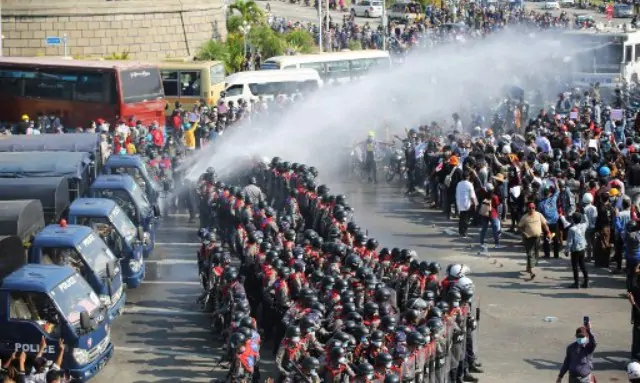Protests swell in Myanmar week after military coup; police uses water cannon on protester – World News , Firstpost
[ad_1]
In Yangon, the nation’s commercial capital, massive throngs spilled onto the city’s main roads, immobilising traffic across the city and dwarfing the previous day’s crowds
A police vehicle fires water cannon in an attempt to disperse protesters during a demonstration against the military coup in Naypyidaw on February 8, 2021. AFP
Yangon: Myanmar’s generals faced their biggest opposition yet to last week’s coup, with huge crowds across the country on Monday demanding the release of ousted leader Aung San Suu Kyi.
The junta has so far refrained from using deadly force to quell nationwide demonstrations, but with pressure building, riot police fired water cannon in an attempt to disperse thousands on the streets of Naypyidaw on Monday.
The military last week detained Suu Kyi and dozens of other members of her National League for Democracy party, ending a decade of civilian rule and triggering widespread international condemnation.
Tens of thousands of people rallied over the weekend in the first major outpourings of opposition, and the movement built on Monday with bigger protests in key locations across the country plus the start of a nationwide strike.
In Yangon, the nation’s commercial capital, massive throngs spilt onto the city’s main roads, immobilising traffic across the city and dwarfing the previous day’s crowds.
“Down with military dictatorship” and “release Daw Aung San Suu Kyi and arrested people”, the protesters chanted, flashing the three-finger salute that has come to symbolise their movement as cars honked their horns in support.
Some held signs saying: “Save Myanmar” and: “We want democracy” while others rode on the back of trucks singing revolutionary songs.
Calls for a nationwide strike had gathered momentum over the weekend, with textile workers, civil servants and railway employees walking off the job in the commercial hub.
“This is a workday, but we aren’t going to work even if our salary will be cut,” one protester, 28-year-old garment factory worker, Hnin Thazin, told AFP.
Construction worker Chit Min, 18, joined the Yangon rally saying his loyalty to Suu Kyi outweighed his immediate concerns about his financial situation.
“I am jobless now for a week because of the military coup, and I am worried for my survival,” he told AFP.
Similarly, large crowds marched in Mandalay, the second-largest city and former seat of the country’s pre-colonial monarchy, many clutching photos of Suu Kyi and waving the red flags of her NLD party.
Police attempted to disperse thousands of people gathered on a highway in Naypyidaw, where Suu Kyi is still believed to be detained.
A truck shot water cannon into the crowd, injuring at least two demonstrators, according to a photographer on the scene.
Huge rallies were also reported across much of the country, including the southern cities of Dawei and Hpa-an.
State of emergency
Myanmar’s generals staged their putsch by detaining Suu Kyi, 75, and other top NLD leaders in pre-dawn raids.
The generals justified the coup by claiming fraud in last November’s elections, which the NLD won in a landslide.
The junta proclaimed a one-year state of emergency and promised to hold fresh elections after that, without offering any precise timeframe.
US President Joe Biden has led the global calls for the generals to relinquish power.
Pope Francis on Sunday also expressed “solidarity with the people of Myanmar”, urging the army to work towards “democratic coexistence”.
Defiance
Other bold displays of defiance inside Myanmar have included a nightly clamour of people banging pots and pans — a practice traditionally associated with driving out evil spirits.
The surge in popular dissent on the weekend overcame a nationwide internet blockade, even bigger in magnitude to an earlier shutdown that coincided with the start of the coup.
The junta has also ordered telecom networks to freeze access to Facebook, an extremely popular service in the country and arguably its main mode of communication.
But on Sunday, live Facebook video feeds from multiple cities continued to show protesters marching through the streets.
Myanmar’s military had ruled the country for decades before allowing civilian rule a decade ago.
As the opposition leader, Suu Kyi spent large chunks of her life under house arrest during the previous dictatorship, winning the Nobel peace prize for those efforts.
Kyaw Zin Tun, an engineer, said Monday while protesting in Yangon he remembered the fear he felt growing up under junta rule during his childhood in the 1990s.
“In the last five years under democracy government, our fears were removed. But now fear is back again with us, therefore, we have to throw out this military junta for the future of all of us,” the 29-year-old told AFP.
Subscribe to Moneycontrol Pro at ₹499 for the first year. Use code PRO499. Limited period offer. *T&C apply
[ad_2]
Source link


Comments are closed.